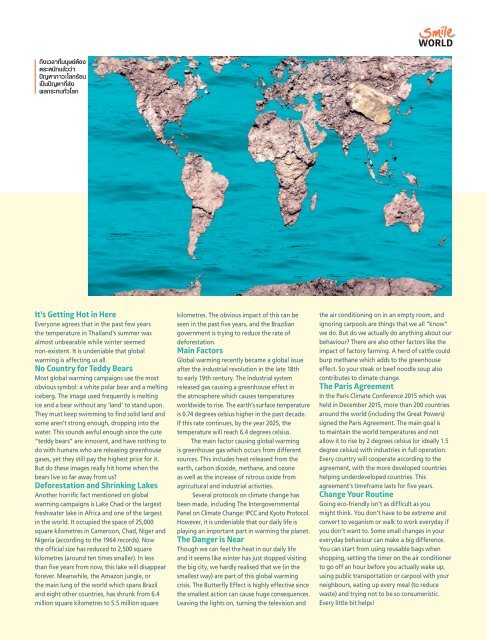WE Smile Magazine February 2016
The In-Flight Magazine of Thai Smile Airways
The In-Flight Magazine of Thai Smile Airways
You also want an ePaper? Increase the reach of your titles
YUMPU automatically turns print PDFs into web optimized ePapers that Google loves.
WORLD<br />
ถึงเวลาที่มนุษย์ต้อง<br />
ตระหนักแล้วว่า<br />
ปัญหาภาวะโลกร้อน<br />
เป็นปัญหาที่ส่ง<br />
ผลกระทบทั่วโลก<br />
It’s Getting Hot in Here<br />
Everyone agrees that in the past few years<br />
the temperature in Thailand’s summer was<br />
almost unbearable while winter seemed<br />
non-existent. It is undeniable that global<br />
warming is affecting us all.<br />
No Country for Teddy Bears<br />
Most global warming campaigns use the most<br />
obvious symbol: a white polar bear and a melting<br />
iceberg. The image used frequently is melting<br />
ice and a bear without any ‘land’ to stand upon.<br />
They must keep swimming to find solid land and<br />
some aren’t strong enough, dropping into the<br />
water. This sounds awful enough since the cute<br />
“teddy bears” are innocent, and have nothing to<br />
do with humans who are releasing greenhouse<br />
gases, yet they still pay the highest price for it.<br />
But do these images really hit home when the<br />
bears live so far away from us?<br />
Deforestation and Shrinking Lakes<br />
Another horrific fact mentioned on global<br />
warming campaigns is Lake Chad or the largest<br />
freshwater lake in Africa and one of the largest<br />
in the world. It occupied the space of 25,000<br />
square kilometres in Cameroon, Chad, Niger and<br />
Nigeria (according to the 1964 records). Now<br />
the official size has reduced to 2,500 square<br />
kilometres (around ten times smaller). In less<br />
than five years from now, this lake will disappear<br />
forever. Meanwhile, the Amazon jungle, or<br />
the main lung of the world which spans Brazil<br />
and eight other countries, has shrunk from 6.4<br />
million square kilometres to 5.5 million square<br />
kilometres. The obvious impact of this can be<br />
seen in the past five years, and the Brazilian<br />
government is trying to reduce the rate of<br />
deforestation.<br />
Main Factors<br />
Global warming recently became a global issue<br />
after the industrial revolution in the late 18th<br />
to early 19th century. The industrial system<br />
released gas causing a greenhouse effect in<br />
the atmosphere which causes temperatures<br />
worldwide to rise. The earth’s surface temperature<br />
is 0.74 degrees celsius higher in the past decade.<br />
If this rate continues, by the year 2025, the<br />
temperature will reach 6.4 degrees celsius.<br />
The main factor causing global warming<br />
is greenhouse gas which occurs from different<br />
sources. This includes heat released from the<br />
earth, carbon dioxide, methane, and ozone<br />
as well as the increase of nitrous oxide from<br />
agricultural and industrial activities.<br />
Several protocols on climate change has<br />
been made, including The Intergovernmental<br />
Panel on Climate Change: IPCC and Kyoto Protocol.<br />
However, it is undeniable that our daily life is<br />
playing an important part in warming the planet.<br />
The Danger is Near<br />
Though we can feel the heat in our daily life<br />
and it seems like winter has just stopped visiting<br />
the big city, we hardly realised that we (in the<br />
smallest way) are part of this global warming<br />
crisis. The Butterfly Effect is highly effective since<br />
the smallest action can cause huge consequences.<br />
Leaving the lights on, turning the television and<br />
the air conditioning on in an empty room, and<br />
ignoring carpools are things that we all “know”<br />
we do. But do we actually do anything about our<br />
behaviour? There are also other factors like the<br />
impact of factory farming. A herd of cattle could<br />
burp methane which adds to the greenhouse<br />
effect. So your steak or beef noodle soup also<br />
contributes to climate change.<br />
The Paris Agreement<br />
In the Paris Climate Conference 2015 which was<br />
held in December 2015, more than 200 countries<br />
around the world (including the Great Powers)<br />
signed the Paris Agreement. The main goal is<br />
to maintain the world temperatures and not<br />
allow it to rise by 2 degrees celsius (or ideally 1.5<br />
degree celsius) with industries in full operation.<br />
Every country will cooperate according to the<br />
agreement, with the more developed countries<br />
helping underdeveloped countries. This<br />
agreement’s timeframe lasts for five years.<br />
Change Your Routine<br />
Going eco-friendly isn’t as difficult as you<br />
might think. You don’t have to be extreme and<br />
convert to veganism or walk to work everyday if<br />
you don’t want to. Some small changes in your<br />
everyday behaviour can make a big difference.<br />
You can start from using reusable bags when<br />
shopping, setting the timer on the air conditioner<br />
to go off an hour before you actually wake up,<br />
using public transportation or carpool with your<br />
neighbours, eating up every meal (to reduce<br />
waste) and trying not to be so consumeristic.<br />
Every little bit helps!

















